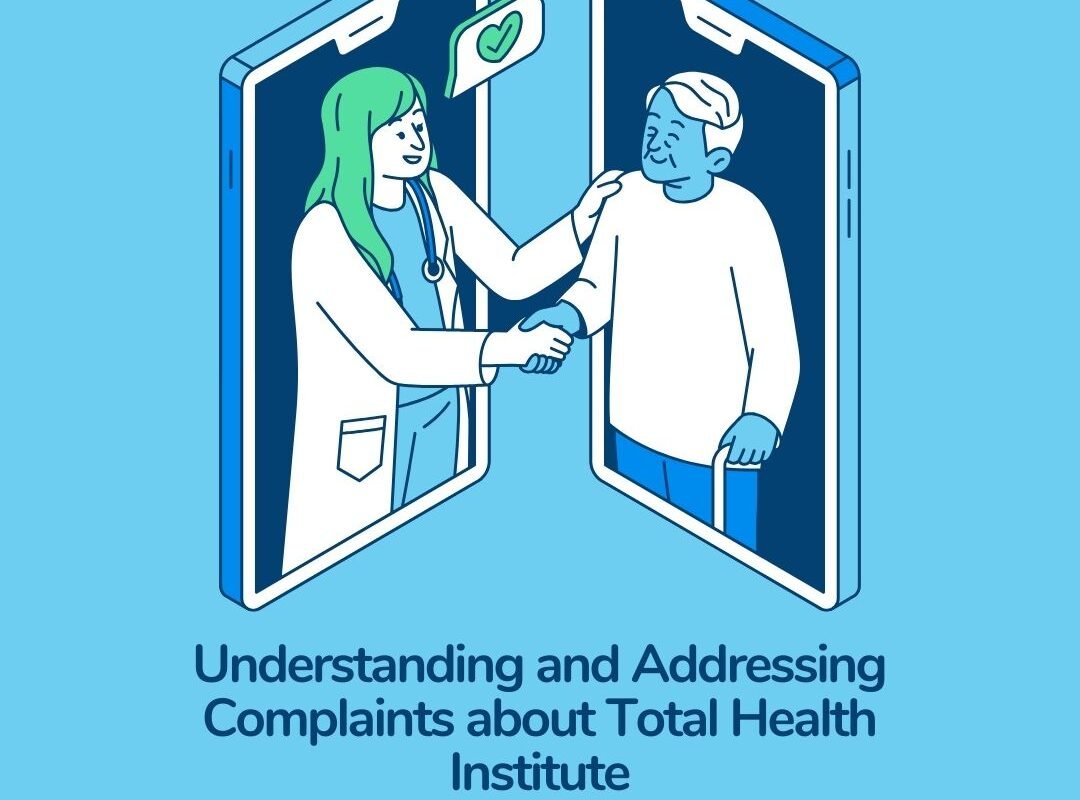Total Health Institute is a prominent healthcare organization renowned for its commitment to holistic health approaches. The institute’s mission is to provide comprehensive, integrative healthcare solutions that address the physical, emotional, and spiritual aspects of well-being. By embracing a multifaceted approach to health, Total Health Institute aims to offer patients a path to optimal wellness through natural and non-invasive treatments.
The services offered by Total Health Institute encompass a wide range of holistic modalities, including nutritional counseling, detoxification programs, mind-body therapies, and alternative medicine practices. The institute also places a strong emphasis on preventative care, encouraging patients to adopt lifestyle changes that promote long-term health and vitality. This integrative strategy is designed to treat the root causes of illness, rather than merely alleviating symptoms.
Total Health Institute serves a diverse clientele, ranging from individuals seeking preventive care to those with chronic health conditions looking for alternative treatment options. The institute’s target audience includes people who are open to exploring holistic and natural approaches to health, as well as those who may have become disillusioned with conventional medical treatments. By providing a supportive and nurturing environment, Total Health Institute aims to empower patients on their journey to better health.
In the healthcare community, Total Health Institute has earned a reputation for its dedication to patient-centered care and its innovative use of holistic therapies. The institute’s practitioners are highly trained and experienced in various disciplines of natural medicine, ensuring that patients receive personalized and effective treatment plans. This commitment to excellence has made Total Health Institute a respected name in holistic health circles.
This introduction provides a foundational understanding of Total Health Institute’s mission, services, and reputation, setting the stage for a deeper exploration of the context surrounding any complaints that may arise. By appreciating the institute’s holistic approach and its place in the healthcare landscape, readers can better understand the complexities involved in addressing and resolving patient concerns.
Common Types of Complaints
Customers of Total Health Institute have reported a range of complaints that can be categorized primarily into five main areas: customer service, treatment effectiveness, pricing, communication, and administrative processes. Understanding these common types of complaints can provide insight into the areas where Total Health Institute might need to improve to meet patient expectations better.
One frequent area of concern revolves around customer service. Some patients have expressed dissatisfaction with the responsiveness and attitude of the staff. For instance, there are accounts of long wait times for appointments and perceived indifference from customer service representatives when addressing issues. These experiences can significantly impact the overall satisfaction of patients, leading to negative perceptions of the institute.
Treatment effectiveness is another major category of complaints. While Total Health Institute offers a variety of holistic health treatments, not all patients have experienced the desired outcomes. Instances where patients feel that the treatments did not significantly improve their health or where the benefits were not as advertised have been noted. Such complaints often highlight the need for more transparent communication about what patients can realistically expect from their treatments.
Pricing and the value of services provided have also been common points of contention. Some patients feel that the costs of treatments and services at Total Health Institute are high compared to the perceived benefits. Complaints in this category often point to a lack of clear pricing information upfront, leading to unexpected expenses that frustrate patients.
Communication issues are another recurring theme in the complaints. Patients have reported difficulties in obtaining timely and clear information about their treatment plans, appointment schedules, and billing. Effective communication is crucial in healthcare settings, and any lapses can lead to confusion and mistrust among patients.
Lastly, administrative processes at Total Health Institute have also drawn criticism. Issues such as errors in medical records, delays in processing paperwork, and problems with insurance claims have been reported. These administrative hiccups can create additional stress for patients, detracting from their overall experience.
By addressing these common types of complaints, Total Health Institute can work towards enhancing patient satisfaction and trust in their services. Identifying and rectifying these issues is essential for maintaining a positive reputation and ensuring the well-being of their patients.
Analyzing Customer Service Issues
Complaints about Total Health Institute’s customer service often revolve around staff behavior, responsiveness, and administrative processes. These aspects are critical because they significantly affect the overall patient experience. When patients feel neglected or disrespected, their trust in the healthcare provider diminishes, leading to dissatisfaction and increased complaints.
Staff behavior is a common concern among patients. Reports of unprofessionalism, lack of empathy, or even outright rudeness can severely tarnish the institute’s reputation. Staff training programs focusing on communication skills, empathy, and patient care are essential to mitigate these issues. Additionally, fostering a culture of respect and professionalism within the institute can help reduce such complaints.
Responsiveness is another critical area where Total Health Institute appears to face challenges. Delays in responding to patient inquiries, whether through phone calls, emails, or in-person interactions, can create frustration and anxiety. Efficient triaging systems and better time management practices could enhance responsiveness. Implementing customer relationship management (CRM) systems may also streamline communication and ensure that no patient concern goes unattended.
Administrative processes also play a significant role in customer service complaints. Complicated appointment scheduling systems, billing errors, and long wait times are frequently mentioned in patient feedback. Simplifying administrative procedures and adopting more user-friendly technologies could improve patient satisfaction. Clear communication about processes and expected timelines can also help manage patient expectations and reduce misunderstandings.
Patterns in these complaints suggest systemic issues rather than isolated incidents. For instance, multiple complaints about scheduling difficulties point to a need for overhauling the appointment system. Similarly, consistent reports of staff unprofessionalism indicate a deeper issue that requires comprehensive training and possibly a review of hiring practices.
Addressing these customer service issues is vital for enhancing the overall patient experience at Total Health Institute. By focusing on improving staff behavior, increasing responsiveness, and streamlining administrative processes, the institute can foster a more positive and trustful relationship with its patients.
Evaluating Treatment Effectiveness Concerns
When addressing complaints about the effectiveness of treatments at Total Health Institute, it is critical to consider various perspectives. Patients often voice concerns about a lack of improvement in their health conditions, unexpected side effects, or unmet expectations. These grievances can stem from multiple sources, including the treatments themselves, miscommunication between patients and healthcare providers, or unrealistic expectations held by the patients.
One primary concern is the perceived lack of improvement in health conditions. Patients may enter treatment with the hope of rapid or significant changes, only to find progress slower than anticipated. It is essential to understand that many health conditions require long-term management and that some treatments may take time to show noticeable effects. Thorough communication from healthcare providers about the expected timeline and potential outcomes can help manage these expectations effectively.
Another common issue relates to side effects. While side effects are an inherent risk of many medical treatments, patients may not always be fully informed about what to expect. Comprehensive pre-treatment consultations that detail possible side effects and how they can be managed can play a crucial role in mitigating patient dissatisfaction. Furthermore, continuous monitoring and adjustments to treatment plans can help address any adverse reactions promptly.
Unmet expectations are often a result of miscommunication or a misunderstanding of what the treatments can realistically achieve. Patients may have high hopes based on anecdotal success stories or marketing materials, leading to disappointment if their experiences do not align. Clear, honest, and detailed explanations about the scope and limitations of the treatments offered at Total Health Institute are necessary to set realistic expectations from the outset.
In examining these concerns, it becomes evident that effective communication and patient education are pivotal. By ensuring that patients are well-informed about the nature, risks, and realistic outcomes of their treatments, Total Health Institute can significantly reduce complaints related to treatment effectiveness. Such measures also enhance patient satisfaction and trust in their healthcare journey.
Pricing and Cost Transparency
One of the primary concerns raised by individuals regarding Total Health Institute is related to pricing and cost transparency. Reports have surfaced about unexpected charges and a perceived lack of clarity in the pricing structures, which has led to dissatisfaction among some clients. This issue often stems from a misunderstanding or miscommunication about service costs and the associated fees.
Unexpected charges can significantly impact the client experience, leading to frustration and a sense of mistrust. For many, the surprise comes from additional fees that were not initially disclosed or from services that were not clearly outlined in the initial agreement. These complaints highlight the importance of clear and upfront communication about all potential costs involved in the services provided by Total Health Institute.
Furthermore, the complexity of the pricing structures at Total Health Institute may contribute to the confusion. Clients have reported difficulties in understanding the breakdown of costs for various services, which can lead to misinterpretations and dissatisfaction. This suggests that a more straightforward and transparent pricing model could greatly enhance client trust and satisfaction.
On the other hand, it is important to acknowledge the value received for the cost at Total Health Institute. Many clients have expressed satisfaction with the quality of care and the comprehensive nature of the services provided. However, the perceived value can be overshadowed by issues related to cost transparency. Ensuring that clients understand exactly what they are paying for and why can help reinforce the value proposition of the institute’s services.
To address these concerns, Total Health Institute could benefit from implementing better communication strategies and clearer pricing policies. This might include detailed pricing breakdowns, upfront disclosure of all potential charges, and regular updates to clients about any changes in pricing. By fostering an environment of transparency and open communication, Total Health Institute can alleviate concerns related to pricing and enhance overall client satisfaction.
Quality of Communication
Effective communication is a cornerstone of patient satisfaction and trust in any healthcare facility, and Total Health Institute is no exception. However, there have been complaints about the quality of communication between patients and the institute. Patients have reported instances of miscommunication, lack of follow-up, and insufficient information being provided, which can significantly impact their overall experience and perception of the institute.
Miscommunication can arise in various forms, such as unclear instructions, incorrect information about treatment plans, or misunderstandings about appointment schedules. These issues can lead to confusion and frustration among patients, potentially affecting their adherence to treatment protocols and overall health outcomes. Furthermore, when patients feel that they are not being heard or understood, it can erode their trust in the healthcare provider.
Lack of follow-up is another critical area of concern. Patients expect timely and appropriate follow-up communications, especially after undergoing significant treatments or consultations. When follow-up is inadequate or nonexistent, patients may feel neglected or undervalued, leading to a decline in their satisfaction with the services provided by the Total Health Institute. This can also result in missed opportunities for addressing any post-treatment complications or concerns promptly.
Insufficient information is equally detrimental. Patients rely on clear and comprehensive information to make informed decisions about their health. When this information is lacking or presented in a manner that is difficult to understand, it can leave patients feeling anxious and uncertain. This can further escalate dissatisfaction, as patients may feel that their health concerns are not being adequately addressed or that they are not receiving the best possible care.
Addressing these communication issues is vital for enhancing patient satisfaction and trust in Total Health Institute. By ensuring clear, consistent, and comprehensive communication, the institute can foster a more positive patient experience, ultimately leading to better health outcomes and stronger patient-provider relationships.
Steps Taken by Total Health Institute to Address Complaints
In response to various complaints, Total Health Institute has undertaken several proactive measures aimed at improving patient experience and ensuring quality service. Understanding the importance of addressing concerns promptly, the Institute has introduced a comprehensive complaints management system. This system is designed to log, track, and resolve complaints efficiently, thereby fostering a culture of accountability and transparency.
Policy changes have been a cornerstone of Total Health Institute’s strategy to address grievances. The Institute has revisited and revised its service policies to align more closely with patient needs and expectations. These policy reforms include clear guidelines on patient rights, service delivery standards, and timelines for addressing complaints. By streamlining these processes, the Institute aims to provide a more responsive and patient-centric approach.
Staff training has also been prioritized to ensure that all employees are well-equipped to handle complaints with professionalism and empathy. Regular training sessions focus on enhancing communication skills, conflict resolution, and customer service excellence. This ongoing education ensures that staff members can address patient concerns effectively and with a greater understanding of the issues at hand.
Improved communication strategies have been implemented to bridge any gaps between patients and the Institute. This includes the introduction of multiple channels for patients to express their concerns, such as dedicated helplines, online feedback forms, and in-person meetings. By offering various platforms for feedback, Total Health Institute ensures that all patient voices are heard and addressed in a timely manner.
Enhanced customer service protocols have been established to provide a more supportive and responsive environment. These protocols involve regular follow-ups on complaints, personalized responses to patient feedback, and a commitment to resolving issues to the satisfaction of all parties involved. Positive outcomes from these efforts have been reflected in improved patient satisfaction scores and a reduction in the number of unresolved complaints.
Overall, Total Health Institute’s comprehensive approach to addressing complaints underscores its commitment to continuous improvement and patient care excellence. Through policy changes, staff training, enhanced communication, and improved customer service, the Institute strives to meet and exceed patient expectations.
Conclusion and Future Recommendations
In reviewing the various facets of complaints regarding Total Health Institute, it is evident that patient satisfaction is a multifaceted issue that requires continuous attention and improvement. Addressing these concerns thoughtfully and proactively can significantly enhance the overall patient experience. Key points discussed include the necessity for transparent communication, the importance of empathetic patient interactions, and the role of thorough follow-ups in mitigating dissatisfaction.
To further improve patient satisfaction and reduce complaints, Total Health Institute should prioritize the implementation of systematic feedback mechanisms. Regularly soliciting patient feedback through surveys, suggestion boxes, and direct communication channels can provide valuable insights into areas needing improvement. This feedback loop should be integral to the institute’s operational strategy, allowing for the timely identification and resolution of potential issues.
Continuous improvement is another critical aspect that Total Health Institute must focus on. This involves not only addressing current complaints but also anticipating potential future issues through data analysis and trend monitoring. By adopting a proactive approach, the institute can implement preventative measures that enhance the patient experience and reduce the likelihood of recurrent complaints.
Maintaining open lines of communication with patients is paramount. This can be achieved by ensuring that all staff members are trained in effective communication skills and are encouraged to engage with patients positively and empathetically. Transparent communication about treatment plans, expected outcomes, and potential side effects can help manage patient expectations and foster trust.
In conclusion, Total Health Institute’s commitment to addressing patient complaints is a step in the right direction. By fostering a culture of ongoing feedback, continuous improvement, and open communication, the institute can not only resolve current issues but also build a foundation for long-term patient satisfaction. This holistic approach will ensure that Total Health Institute remains responsive to patient needs and continues to provide high-quality care.



